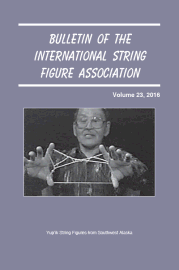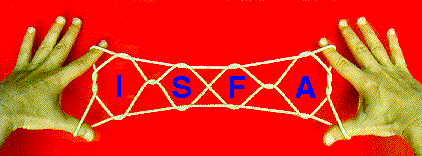Articles de isfa
-
Volume 23 (2016): 230 pages - Table des Matières
- Par isfa
- Le 20/07/2019
- Dans Bisfa 23
- 0 commentaire
Edité par - Mark A. Sherman, Pasadena, California
Rédacteurs Associés - Joseph D'Antoni, Queens, New York; Myriam Namolaru, Haifa, Israel;
Belinda Holbrook, Davenport, Iowa; Stephan Claassen, Best, Netherlands.
Comité de Rédaction - Hiroshi Noguchi, Tokyo, Japan; Philip Noble, Inverness, EcosseLe Bulletin de l'Association Internationale du Jeu de Ficelle (BISFA) est une publication savante
présentant des documents originaux qui fait progresser notre compréhension et renforce
notre plaisir des jeux de ficelle. BISFA est publié annuellement, en septembre, par ISFA Press
(Pasadena, Californie). BISFA remplace le Bulletin de l'Association des Jeux de Ficelle,
(Toky Nippon Ayatori Kyokai), qui a été publiée en 19 volumes (1978-1993).
Les traductions proposées ne comprennent pas les illustrations et photos du texte original.
J'ai traduit ces textes pour vous donner un aperçu de la qualité et de la richesse de
ces publications.
Special Issue: Yup'ik String Figures from Southwest Alaska
- Yup’ik String Figures as made by Gregory Kapatak Sr. (Koliganek, Southwest Alaska) in 1981 by Stephan Claassen, Best, Netherlands (pages 1-101) - In 1981 Tupou Pulu and Mark Hiratsuka, of the Alaska Bilingual/Multicultural Materials Development Center, recorded the string figure making of Gregory “Kokwak” Kapatak and Anna “Grandma” Backford. This resulted in some two hours of film footage. The current paper presents all 31 string figures and series that Gregory Kapatak made during the recording sessions. Small construction variants that occur in the footage are studied. Two figures in the collection have probably not been published before, and four further figures show hitherto unknown peculiarities. The number and the nature of the variants in the construction of figures is small; structural characteristics determine the choice of a particular variant, though not exclusively.
- Some Yup’ik String Figures as made by Anna Backford (Nushagak, Southwest Alaska) in 1981 by Stephan Claassen, Best, Netherlands (pages 102-127) - The present paper presents 14 string figures as made by Anna “Grandma” Backford in 1981. All figures have been recorded elsewhere. Anna Backford uses Opening A* instead of Opening A consistently. Structural factors determine the choice for particular construction techniques.
- Yup’ik String Figures as made by Carley Foster from Eek, Alaska by Stephan Claassen, Best, Netherlands (pages 128-213) - This paper presents 31 different string figures/tricks as made by Carley Foster from Eek, Southwest Alaska, in 2001. They were recorded on video tape by David Titus. One figure and one continuation of a figure have probably not been recorded before. An analysis of the variation in Thumb Loop Drop techniques indicates that structural characteristics of the string figure configuration prior to the application of the Thumb Loop Drop tend to favor the choice of a particular technique. This is consistent with results from studies of other Alaskan string figure makers. Hardly ever does Carley Foster vary in the choice of a Thumb Loop Drop technique between different makings of the same figure.
Nomenclature - by Mark Sherman (pages 214-225)





